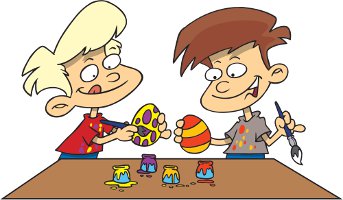


Subject-verb agreement in English isn't so hard, but some sentences are tricky! The most important verb to practice is the verb be, and the trickiest tenses are the simple present and the present progressive.
Look at the examples below and then practice with the exercises. Remember to look very carefully at the subject before you answer!

Click Here for Step-by-Step Rules, Stories and Exercises to Practice All English Tenses
Before we begin, it's a good idea to review the page on subject-verb agreement where there are examples for lots of the rules that we will practice below.
It's also also helpful to go over the rules on countable and uncountable nouns. When you feel comfortable with the rules, it's time to practice!

Correct: She is worried about all that work!
Incorrect: She are worried about all that work!
 are wonderful dancers." width="" height="" />
are wonderful dancers." width="" height="" />
Correct: They are wonderful dancers. /
Edna and Ralph are wonderful dancers.
Incorrect: They am wonderful dancers.

Correct: "I am so tired!"
Incorrect: "I is so tired!"
Directions: Read the sentences below carefully. Identify the subject and use the correct form of the verb be .
1. Emily __________ an intelligent little girl who likes to build model airplanes.
2. My parents __________ very good neighbors and they always help their friends.
3. Eric and Brad __________ older than me.
4. I __________ a good swimmer, but I don't play basketball very well.
5. The dog __________ asleep on the patio.
6. My friends __________ all busy this weekend.
7. The children's new English teacher __________ from Ireland.
8. We __________ interested in team sports.
9. The apple juice __________ in the refrigerator.
10. He __________ on vacation until next week.

Correct: She likes to keep her closet very organized.
Incorrect: She like to keep her closet very organized.

Correct: They decorate eggs together every year at Easter time.
Incorrect: They decorates eggs together every year at Easter time.
Directions: Read the sentences below carefully. Identify the subject and use the correct form of the verb in the simple present . You should use the verb in parentheses, ( ), at the end of the sentence.
1. Kristen and Loretta __________ a big math test on Tuesday. (have)
2. My daughter Angela __________ there is a monster in her closet. (think)
3. Meredith's best friend __________ in a clothing store. (work)
4. Chris __________ to eat lots of vegetables. (try)
5. I __________ as often as I can! (travel)
6. My neighbors __________ to music very early in the morning. (listen)
7. Of all the students in the class, Uri __________ the most. (study)
8. Yolanda __________ new shoes about once every six months. (buy)

Correct: They are getting married.
Incorrect: They is getting married.
Incorrect: They are get married.

Correct: "I am training for a marathon!"
Incorrect: "I is training for a marathon!"
Incorrect: "I is train for a marathon!"
Note: "am training" is a verb phrase (auxiliary verb + main verb)
Directions: Choose the correct verb phrase from the list to complete the sentences below.
is cooking are playing is eating am having are talking
1. All the children ____________________ with their new toys.
2. My mother ____________________ dinner in the kitchen.
3. Christopher and Lois ____________________ about some very interesting subjects.
4. I ____________________ some trouble with this math problem. Can you help?
5. The cat ____________________ food from its bowl.
Sometimes subjects are more complicated than just a person's name.

Correct: Heidi is telling Olga a story.
Some of the story is true, but not all of it!
Incorrect: Some of the story are true, but not all of it!
Correct: Heidi is telling Olga some stories.
Some of the stories are true, but not all of them!
Incorrect: Some of the stories is true, but not all of them!

Correct: Most of the group is smiling.
Incorrect: Most of the group are smiling.
Correct: Most of the people are smiling.
Incorrect: Most of the people is smiling.
Directions: Read the sentences below carefully. Identify the subject and use the correct form of the verb in the simple present . You should use the verb in parentheses, ( ), at the end of the sentence.
1. A lot of the problem __________ just bad communication. (be)
2. Many of the new students __________ tennis very well. (play)
3. Some of the food __________ a little strange to me. (look)
4. Most of the book __________ very useful. (be)
5. Some of the chapters __________ really interesting information. ( contain)

Correct: Neither John nor Carol has very much work today.
Correct: Neither of them has very much work today.
Incorrect: Neither John nor Carol have very much work today.
Incorrect: Neither of them have very much work today.
 or the cake is a good choice." width="" height="" />
or the cake is a good choice." width="" height="" />
Correct: Either the cookies or the cake is a good choice.
Correct: Either the cake or the cookies are a good choice.
Remember that in this case the verb depends
on the subject closest to it.
Incorrect: Either the cookies or the cake are a good choice.
Incorrect: Either the cake or the cookies is a good choice.
Directions: Read the sentences below carefully. Identify the subject and use the correct form of the verb in the simple present . You should use the verb in parentheses, ( ), at the end of the sentence.
1. Neither of my children ___________ broccoli. (like)
2. Either the girls or the boys ___________ to take the first turn at basketball. (need)
3. Neither Emily nor Melissa ___________ where the library is. ( know)
4. Either Henry or Luke ___________ available to help with that project. (be)
5. Neither of them ___________ very busy at the moment. (be)
Exercise A: the verb BE
1. Emily is an intelligent little girl who likes to build model airplanes.
2. My parents are very good neighbors and they always help their friends.
3. Eric and Brad are older than me.
4. I am a good swimmer, but I don't play basketball very well.
5. The dog is asleep on the patio.
6. My friends are all busy this weekend.
7. The children's new English teacher is from Ireland.
8. We are interested in team sports.
9. The apple juice is in the refrigerator.
10. He is on vacation until next week.
Exercise B: the simple present
1. Kristen and Loretta have a big math test on Tuesday.
2. My daughter Angela thinks there is a monster in her closet.
3. Meredith's best friend works in a clothing store.
4. Chris tries to eat lots of vegetables.
5. I travel as often as I can!
6. My neighbors listen to music very early in the morning.
7. Of all the students in the class, Uri studies the most.
8. Yolanda buys new shoes about once every six months.
Exercise C: the present progressive
1. All the children are playing with their new toys.
2. My mother is cooking dinner in the kitchen.
3. Christopher and Lois are talking about some very interesting subjects.
4. I am having some trouble with this math problem. Can you help?
5. The cat is eating food from its bowl.
Exercise D: "a group of students", "some of the stories", etc.
1. A lot of the problem is just bad communication.
2. Many of the new students play tennis very well.
3. Some of the food looks a little strange to me.
4. Most of the book is very useful.
5. Some of the chapters contain really interesting information.
Exercise E: neither/nor and either/or
1. Neither of my children likes broccoli.
2. Either the girls or the boys need to take the first turn at basketball.
3. Neither Emily nor Melissa knows where the library is.
4. Either Henry or Luke is available to help with that project.
5. Neither of them is very busy at the moment.

By submitting your email, you consent to receiving updates and newsletters from us and to the sharing of your personal data with third parties for the purposes of sending you communications. We will not spam you. You can unsubscribe at any time. For more information, please see our privacy policy.